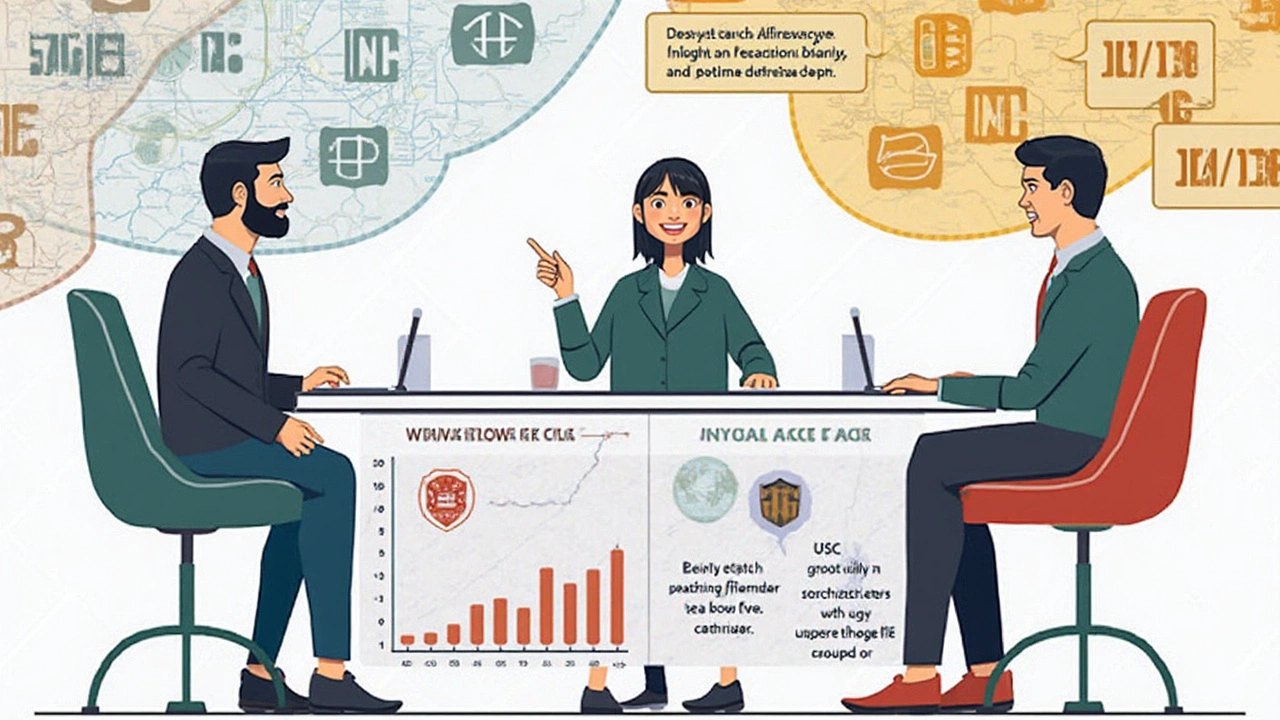Thinking about signing up for advanced classes but stuck between A levels and AP? You’re not alone—lots of students get stumped by this question, especially when college admissions and future plans hang in the balance. Each pathway has a reputation: A levels are known for being deep and specialized, while AP is all about covering a lot of topics fast.
If you don’t want to get buried in textbooks, understanding the differences upfront can save you a ton of stress. A levels go deep into two or three subjects, often making students near-experts by the end. AP lets you try more subjects—sometimes six or seven at once—but the courses move fast, and the exams often test a little bit of everything. So which one is more demanding? Let’s get into what students really need to know, beyond what the marketing brochures say.
- A Levels vs AP: The Core Differences
- Breaking Down the Difficulty
- Exam Styles: What Sets Them Apart
- Student Life: Managing the Workload
- Smart Tips for Choosing the Right Track
A Levels vs AP: The Core Differences
If you’re mapping out your journey through school, understanding the key differences between A Levels and AP matters more than you might think. Both are designed to prep you for university, but they do it in very different ways, and that can totally change your day-to-day workload and long-term plans.
Let’s break it down. A Levels, short for Advanced Level qualifications, are mostly taken by students in the UK and a few other countries. Students usually choose three subjects, sometimes four if they’re really ambitious, and stick with those for two years. The whole point is to go deep—not just skim the basics. Teachers expect you to understand not only facts but also the thinking and debates behind them.
AP, which stands for Advanced Placement, is an American program. Here’s where things get different: AP lets you pick from a buffet of subjects (there are 38 altogether), and you can take anywhere from one to eight in a year, though most students do about four or five. AP courses are usually one school year long, so you can mix and match more easily. The material goes fast but doesn’t dive quite as deep as A Levels.
| Aspect | A Levels | AP |
|---|---|---|
| Typical Number of Subjects | 3-4 | 4-5 (but up to 8 possible) |
| Duration | 2 years | 1 year per course |
| Depth of Study | In-depth, focused | Broader, covers more topics |
| Assessment | Mainly final exams at end of 2 years | Yearly exams at end of each course |
| Recognition | Mainly UK/universities worldwide | Mainly US/universities worldwide |
One big thing to note: A levels are considered the gold standard for British universities, but AP has serious respect in the US. Internationally, both are accepted almost everywhere, but some colleges might prefer one over the other, especially for certain majors. If you’re dreaming of a US Ivy League, AP might fit your plans better; for Oxford or Cambridge, A Levels are what they expect.
It’s not just about location, though. A Levels require a big commitment to specific subjects for two years. Changing your mind later is tough. AP offers way more flexibility—if you hate AP Biology, you’re not stuck with it for years. So, when you’re choosing between the two, ask yourself if you want depth or variety, and check with the universities on your wish list. Nothing’s worse than realizing your hard work isn’t recognized where you want to end up.
Breaking Down the Difficulty
Here’s where things get real. When folks ask if A Levels or AP courses are harder, they usually mean: which one is going to push me further, stress me out more, or take more of my free time? There’s no one-size-fits-all answer, but you can see some clear trends if you look under the hood.
A Levels demand deep knowledge in just a few subjects. For example, if you pick A Level Biology, get ready to dig into tough stuff like genetics, cell structure, and biochemistry; expect long essays and detailed experiments. You don’t get to drop a subject midway, either—once you pick, you stick with it for two years. Compare that with AP, where you can grab a bunch of courses—AP Physics, AP US History, AP French—and each one is usually finished in a year.
A big chunk of A Level grades comes from written exams at the end, with questions that often ask for detailed explanations, step-by-step workings, and even some original thinking. In AP classes, exams are a mix of multiple choice (about 60% of the test in courses like AP Psychology) and some open-ended questions, but rarely do you get the super-deep essay questions found in A Levels.
If numbers help, check this out:
| Program | No. of Subjects at Once | Years to Complete | Avg. Weekly Study Hours per Subject | Exam Style |
|---|---|---|---|---|
| A Levels | 2-4 | 2 | 6-8 | Mostly written, essay-heavy |
| AP | 3-7 | 1 | 3-5 | Multiple choice & shorter free response |
For a lot of students, the A levels are a test of patience and in-depth understanding. You’ll spend more hours just on a handful of subjects. AP students often have to juggle more classes at once, but usually spend less time per subject because the material isn’t as deep.
Here’s the bottom line if you’re weighing which is tougher: A Levels are harder if you struggle with in-depth, essay-based exams. AP is tougher for anyone who finds it hard to jump between lots of very different topics or hates fast-paced workloads. Either way, you need solid time management to keep up, but you won’t be buried in quite as much reading or critical analysis with AP as you will with A Levels.

Exam Styles: What Sets Them Apart
If you’re wondering why A levels and AP feel so different, a lot of it boils down to how their exams are built. A level exams are big on detail, and you usually have to sit for several hours of tests per subject—sometimes three papers for a single subject, each focusing on different topics or skills. You can expect long-answer questions where you have to build a strong argument or solve complex problems, showing real depth of understanding.
AP exams, on the other hand, mix things up. Most APs have both multiple-choice and free-response sections. You’ll get a bunch of questions covering the whole course, so you need to know a bit of everything. AP free-response often means essays, calculations, or even short explanations, but there’s less time to spend on each answer than in A levels.
One thing that trips up students: A level exams make you connect ideas across the full two years. Most schools only let you take A level papers after two years of study, so everything you’ve learned could show up on test day. AP exams test one course at a time, and you can take the test the same year you finish the class. That means the knowledge is fresh, but it’s broad.
- A level marking is strict: high-level answers get top marks, but you need to hit specific criteria and show deep understanding.
- AP scoring is on a 1–5 scale, and you can often earn college credit in the US if you score a 3 or higher (some schools want a 4 or 5).
- Both exams allow calculators for math and sciences, but the question styles still feel very different. A levels might ask for a detailed proof, while AP could ask you to explain a concept in a paragraph.
Bottom line? If you want to specialize and really dig deep, A levels push you into expert mode. If sampling lots of subjects sounds better, AP spreads you wider but not as deep. When it comes to the A levels vs. AP debate, exam style might be the single thing that changes how hard or easy they feel for you.
Student Life: Managing the Workload
Here’s where things get real: balancing studies and life while doing A levels or AP isn’t some side quest—it’s the main event. If you go for A levels, you’ll usually pick just three or sometimes four subjects and stick with them for two full years. Classes dive deep and aren't shy about heavy assignments. Expect essays, projects, and lots of reading. The whole setup really suits students who love a topic and don’t mind sticking with it long term.
AP students, on the other hand, often juggle more classes at once. It's not unusual for someone to take five or six AP courses in one school year, each moving at a rapid pace. You’ll get bombarded with regular quizzes, in-class projects, homework, and timed tests. There’s less time to breathe between topics, so being super organized is a game changer.
Time management matters big time, no matter which path you’re on. With A levels, deadlines are fewer but the projects are huge, leading up to those high-stakes exams at the end. With AP, you get steady work and frequent grading, but major points often come from the big test in May. Staying on top of your daily work helps you avoid a mountain of stress later.
- With A levels, a lot of your grade hinges on the final exams. If you're someone who likes to prep for the big moment and can handle slow-burn stress, this might suit you.
- With AP, there's more continuous assessment, but the AP courses give you feedback all year so you know where you stand.
- Whichever route you pick, don’t try to go it alone. Swap notes with classmates, ask teachers for help, and use resources like study apps or forums developed for your chosen subjects.
Little habits make the biggest impact: making a weekly plan, breaking huge projects into mini-tasks, and just not leaving things until the night before means you’ll actually have free time to, I don’t know, have a life outside school—or at least hang with your cat (Luna tries to sit on my notes every time, so maybe pick a pet-friendly workspace).

Smart Tips for Choosing the Right Track
Let’s cut through the noise: picking between A levels and AP isn’t just about which is “harder.” It’s about which format actually fits the way you work, your future goals, and even your personality. Here’s what you should really focus on before you make the call.
- A levels suit students who prefer depth over breadth. You pick just a few subjects (usually 3 or 4) and spend two years digging in. If you know what you want to study in college—like engineering or medicine—A levels let you double down on those subjects, which universities in the UK and elsewhere appreciate.
- AP is for those who like to sample a wide menu. You can take more subjects at once, which is great if you’re undecided or applying to U.S. colleges that like to see range. But remember, you’ll be juggling six or more classes, all rushing towards exams in May.
Don’t decide based just on the title. Check what your target universities want. For example, Oxford and Cambridge tend to expect specific A level subjects if you’re aiming for certain degrees. U.S. Ivies, on the other hand, see high AP scores as proof you can handle college-level material across the board.
If you’re stuck, make a list of your strengths. Are you someone who loves clear, long-term projects and getting really good at a subject? A levels. Or do you thrive with a fast pace, switching topics, and handling lots of assignments? AP might be a better fit.
| Comparison | A levels | AP |
|---|---|---|
| Subjects Taken | 3-4 (deep dive) | 5-7 (broad) |
| Exam Format | Mainly written exams after 2 years | Yearly exams (multiple choice + essay) |
| Common in | UK, Commonwealth | USA, International schools |
| University Recognition | UK, worldwide (for specialized courses) | USA, some UK & international |
| Pass Rate (2024 data) | ~77% | ~60% score 3+ |
One thing nobody tells you: A level coursework can sometimes count towards your final grade, so if you’re better at coursework than exams, check how your subjects are graded. For AP, everything often hangs on that one big exam—if you freeze under pressure, that’s something to think about.
Talk to students who’ve done both. Ask teachers honestly about workload and support. At the end of the day, picking the right track isn’t about bragging rights; it’s about giving yourself the best shot at success, based on A levels or AP fitting you—not just what’s more popular at your school.






